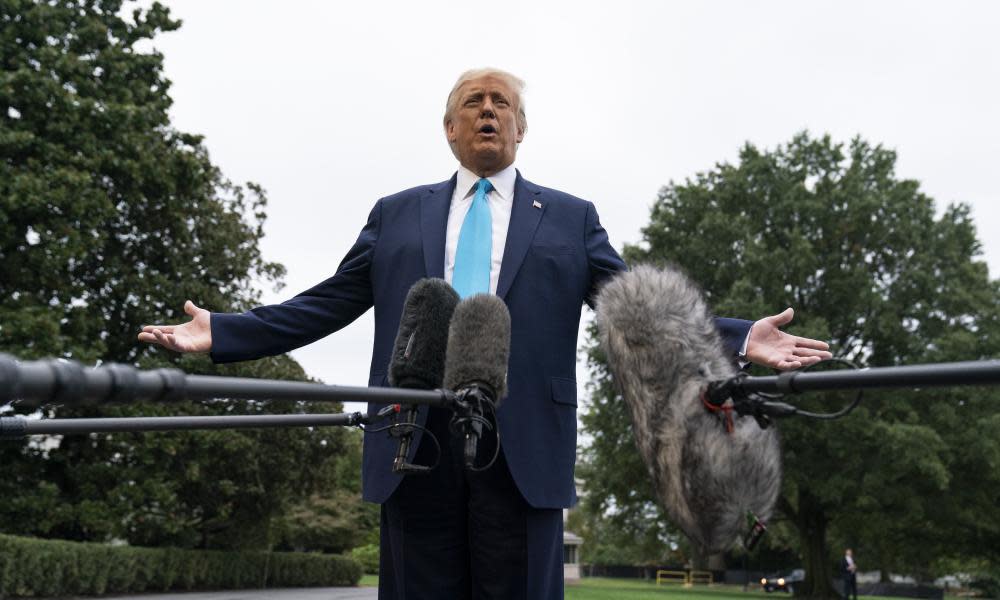McMaster: Trump suggestion he might not cede power is ‘gift to our adversaries’

Donald Trump’s suggestion that he might not cede power if he loses the presidential election to Joe Biden is “a gift to our adversaries”, the former national security adviser HR McMaster said on Sunday, though he added that “even talking about” the US military removing the president if necessary was “irresponsible”.
Related: Where Law Ends review: why Mueller failed to hold Trump to account
“I think what’s really clear for the American people to understand is the military will have no role in a transition,” the retired army general told NBC’s Meet the Press.
“In fact, even talking about it, I think, is irresponsible. And that’s maybe why, if you detect some reticence on the part of senior military leaders or those in the Pentagon to talk about it, it’s because it shouldn’t even be a topic for discussion.”
Nonetheless it is under discussion, as the US military deals with an unprecedented focus on its relations with the president. Numerous senior military figures, among them the former defense secretary James Mattis, have criticised Trump in public.
McMaster did say military participation in Trump’s infamous St John’s church photo op on 1 June, when peaceful protesters were forcibly cleared from around the White House, was “just wrong” and “more than unfortunate”.
“Some of the things the president said I think have been irresponsible,” he said, of Trump’s musings about clinging to power. But he added: “But often times, the reaction to what he says is equally irresponsible. So I think all politicians have a responsibility of keeping that bold line in place.”
McMaster was Trump’s second national security adviser, serving for a little over a year before being fired by tweet. He has now written a book.
But he is at pains to stress that Battlegrounds: The Fight to Defend the Free World is not a “Trump book” in the traditional sense, dishing on West Wing scandal and overtly criticising the president. Such volumes include plentiful reports of how poorly McMaster was treated by Trump but in the face of a barrage of questions about why he has chosen not to fire back, the general has barely moved an inch.
“My job was to give the president access to the best analysis across the government and then to give the president options,” he told NBC. “And then once he made decisions, to assist with the sensible implementation of those decisions.
“Those discussions were wide ranging and, often times … the president evolved his assessment of situations and I think, in many cases, made decisions on foreign policy – which was my area, not domestic politics – that advanced our interests and, in many cases, put in place big shifts in our foreign policy that were long overdue.”
McMaster deflected a question about Trump’s response to the coronavirus pandemic, in which 7m have been infected and more than 200,000 have died. Its failings, he said, were due to breakdowns “in coordination … in common understanding of the resources available, where the gaps were and how to mobilise a response effectively”.
Asked about Trump’s talk of not conceding power, which is stoked by unfounded claims regarding supposed voter fraud around mail-in balloting, McMaster said it was “a gift to our adversaries, who want to shake our confidence in … our democratic principles and institutions and processes.
“What I write about in Battlegrounds is how Russia, for example, has engaged in this campaign of disruption, disinformation and denial. And if the Russians can just use our own words against us, that’s the best way to pull us apart from one another.”
Related: HR McMaster on rugby: 'The warrior ethos is what a good team has'
The former special counsel Robert Mueller, the Senate intelligence committee and the US intelligence community in general have said Russia interfered in the 2016 election to boost Trump against Hillary Clinton. Warnings about such efforts this year are stark. Trump has called such talk a hoax.
McMaster was asked if he agreed with Susan Rice, national security adviser to Barack Obama, that domestic political division should be seen as a national security threat.
“I absolutely agree with her,” he said. “And this is why I think it’s so important for us to come together for civil discussions about the greatest challenges we face. Maybe that’s a way for us to come back together as Americans because as we’re at each other’s throats with this vitriolic partisan discourse, our adversaries haven’t stopped, right? The world hasn’t gone away.
“And that’s what I hope will help galvanise us to come back together and to reverse this polarisation that’s so damaging to our security and our psyche as well.”

 Yahoo News
Yahoo News 
